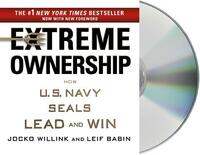Take a photo of a barcode or cover
fast-paced
A supremely boring read, 60% of it being war stories whose quality shift between mediocre and infantile and whose content is riddled with american jingoism. The remaining 40% is baby's first leadership lessons, the kind I would literally find in cartoons.
I was curious if there’d be any unique leadership insight from the military here, but it turns out to be banal advice like “take responsibility for yourself” and “make sure your team understands why you’re asking them to do X”, coated in a heavy veneer of military hero worship. No doubt that veneer is the only way to get a particular subset of men to listen to common-sense advice, but it left me disappointed that there wasn’t more here.
adventurous
informative
sad
tense
medium-paced
challenging
hopeful
informative
inspiring
reflective
relaxing
medium-paced
I’m not sure when I would’ve best benefited from reading this, but felt boring to me, things I’ve heard before and while it doesn’t hurt to hear again, I didn’t particularly relate to the military examples. I most enjoyed hearing about the Echelon Front examples, leading up the chain, decentralized command and decisiveness amid uncertainty.
This book wasn't saying anything new or different from all the other management/life improvement books. Take responsibility. Manage from the bottom up (the latest and greatest way of management). I couldn't physically read it and had to listen to audiobook to even be able to focus. Even then it was difficult because the reading was so dramatic. I had to speed it up a bunch to not deal with the dramatic pauses and slow speech.
I really enjoyed how the book went back and forth from describing a Navy Seal opp in Iraq to applying principles learned to life and business.
Notes:
The only meaningful measure for a leader is whether the team succeeds or fails. For all the definitions, descriptions, and characterizations of leaders, there are only two that matter effective and ineffective. Effective leaders lead successful teams that accomplish the mission and win, and effective leaders do not.
1. Wining the war within
2. The laws of combat
3. Sustaining victory
There are no bad teams; only bad leaders.
Bad leader:
Negative attitude, justifying poor performance. Victimization. Becoming comfortable with sub-par performance.
Tortured Genius:
No matter how obvious his/her failing, or how valid the criticism, a tortured genius excepts zero responsibility for mistakes, makes excuses, and blames everyone else for their failings and those of their team. In their mind, the rest of the world just can't see or appreciate a genius in what they are doing. An individual with a tortured genius mindset can have catastrophic impact on a team's performance.
When it comes to standards, as a leader, it's not what you preach it's what you tolerate. When setting expectations, no matter what has been said or written, If substandard performance is accepted and no one is held accountable, If there are no consequences, that poor performance becomes the new standard. Leaders much enforce standards.
John Paul Jones, the father of the US Navy, said: "Those who will not risk, cannot win."
Discipline equals freedom.
Jocko sets 3 alarms in the morning, one electric, one battery and one wind up. That way there's no excuse for him sleeping too long.
The moment your alarm goes off in the morning is your first test. It sets the tone for the rest of the day. The test is not a complex one; when the alarm goes off, do you get up out of bed or do you lie there in comfort and fall back to sleep. If you have the discipline to get out of bed you win. You passed the test. If you are mentally weak for that moment, and you let that weakness keep you in bed, you fail.
The only way you 'make time' is to get up early. That takes discipline.
"Discipline is paramount to ultimate success and victory for any leader and any team. Although discipline demands control and asceticism, it actually results in freedom. When you have the discipline to get up early, you are rewarded with more free time."
"Disciple, strict order, regimen, and control might appear to be the opposite of total freedom, the power to act, speak, and think without any restrictions; but in fact, discipline is the pathway to freedom."
A leader must control his or her emotions...Leaders who lose their temper also lose respect… But, people do not follow robots.
A leader must be attentive to details but not bogged down by them.
Notes:
The only meaningful measure for a leader is whether the team succeeds or fails. For all the definitions, descriptions, and characterizations of leaders, there are only two that matter effective and ineffective. Effective leaders lead successful teams that accomplish the mission and win, and effective leaders do not.
1. Wining the war within
2. The laws of combat
3. Sustaining victory
There are no bad teams; only bad leaders.
Bad leader:
Negative attitude, justifying poor performance. Victimization. Becoming comfortable with sub-par performance.
Tortured Genius:
No matter how obvious his/her failing, or how valid the criticism, a tortured genius excepts zero responsibility for mistakes, makes excuses, and blames everyone else for their failings and those of their team. In their mind, the rest of the world just can't see or appreciate a genius in what they are doing. An individual with a tortured genius mindset can have catastrophic impact on a team's performance.
When it comes to standards, as a leader, it's not what you preach it's what you tolerate. When setting expectations, no matter what has been said or written, If substandard performance is accepted and no one is held accountable, If there are no consequences, that poor performance becomes the new standard. Leaders much enforce standards.
John Paul Jones, the father of the US Navy, said: "Those who will not risk, cannot win."
Discipline equals freedom.
Jocko sets 3 alarms in the morning, one electric, one battery and one wind up. That way there's no excuse for him sleeping too long.
The moment your alarm goes off in the morning is your first test. It sets the tone for the rest of the day. The test is not a complex one; when the alarm goes off, do you get up out of bed or do you lie there in comfort and fall back to sleep. If you have the discipline to get out of bed you win. You passed the test. If you are mentally weak for that moment, and you let that weakness keep you in bed, you fail.
The only way you 'make time' is to get up early. That takes discipline.
"Discipline is paramount to ultimate success and victory for any leader and any team. Although discipline demands control and asceticism, it actually results in freedom. When you have the discipline to get up early, you are rewarded with more free time."
"Disciple, strict order, regimen, and control might appear to be the opposite of total freedom, the power to act, speak, and think without any restrictions; but in fact, discipline is the pathway to freedom."
A leader must control his or her emotions...Leaders who lose their temper also lose respect… But, people do not follow robots.
A leader must be attentive to details but not bogged down by them.
While I appreciate the message of the book, I felt like it could have been much shorter like a long essay. It took the same key points and just hammered them home with examples. I understand some people need or appreciate it but I felt like I could have read a summary and gotten just as much out of it. I do like Jocko and consume his other content.
I read the first chapter in its entirety. That's it. The principles are short, the stories about their life as Navy Seals (which I skipped after chapter one) was very long. I will go back and jot down the basics, which were good, but not anything eye opening that I haven't read before.
I think it could attract a specific crowd. I just wasn't it.
I think it could attract a specific crowd. I just wasn't it.
Obviously a heavy military read, but after each story it’s broken down into the main lesson/principle of the story and its application to business/non-military setting.

